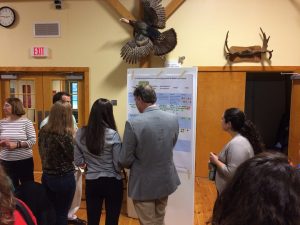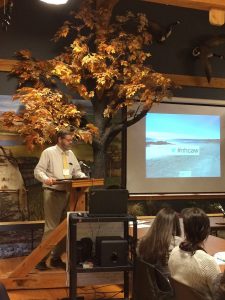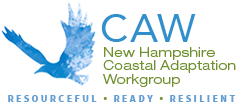By: Kirsten Howard
Greenland, NH – This year’s Climate Summit was a little different than past summits. After working for over eight years with coastal NH communities, the Coastal Adaptation Workgroup (CAW) and our partners have learned a few things about what makes a science-based project successful and useful at the local level. In an effort to share those lessons learned and look ahead to try to ensure that future research-based projects directly meet municipal needs, the 2017 Climate Summit brought together municipal officials, academic researchers, and technical assistance providers to start crafting a project-based research agenda to support coastal resilience in New Hampshire. Here are five big lessons from the day:
#1 Building trust with partners might be the most important ingredient for actionable science.

2017 Climate Summit participants worked together to identify research priorities. Photo: Lisa Graichen, NH Sea Grant and UNH Cooperative Extension
Grant funds are not always available for relationship and trust-building, but that doesn’t change the fact that trust is a critical ingredient for a successful community-based research project. One tip for researchers trying to develop trusting relationships with community partners is: if you make a promise to deliver specific information or an important outcome to a community, make sure you keep that promise.
#2 Slow and steady wins the race.
Durham Department of Public Works Director and Summit panelist Mike Lynch shared that over the course of his 40 years of experience, he’s learned that these kinds of research partnership projects usually take at least twice as long as you think they will. He and Dr. Tom Ballestero from the University of New Hampshire Stormwater Center have been working together for 25 of those 40 years, and their partnership is still going steady (if a little slow).
#3 Keep it relevant to scale and need.
“It worked because we didn’t apply global models to local problems,” panelist Julie LaBranche from the Rockingham Planning Commission mentioned when reflecting on her sea-level rise planning efforts in partnership with communities in coastal New Hampshire and the University of New Hampshire.
Down-scaled sea-level rise maps were critically important to moving coastal communities forward on planning efforts in the Portsmouth Coastal Resilience Initiative, Tides to Storms, and Climate Risk in the Seacoast (C-RiSe) projects. Being able to see potential impacts on a more tangible, local level turned what was previously a hard-to-conceptualize topic into highly relevant and actionable information.
#4 Don’t be afraid to play games.

Dover Planner Steve Bird wins the CAW Coastal Climate Champion Award at the 2017 Climate Summit. Photo: Lisa Graichen
Steve Bird, a Summit panelist and planner in Dover, New Hampshire, reflected on the courage it took to get Dover residents to participate in a role-playing game focused on climate change and stormwater management as part of the Northeast Climate Adaptation Project in partnership with the Massachusetts Institute of Technology and the Great Bay National Estuarine Research Reserve. But, he said it was all worth it. Dover residents are now taking leaps and bounds to plan for climate change impacts. Later in the day, Steve was awarded the Community Climate Adaptation Champion Award at the Climate Summit! Congrats Steve!
#5 Sweat the small stuff and be open to compromise.
After 15 years of trying to maximize stormwater management from low impact development projects in the New Hampshire coastal watershed, Dr. Jamie Houle from the University of New Hampshire Stormwater Center shared that it’s sometimes more effective to do the smaller, easier projects first. The big fancy optimization models may not prioritize the small stuff, but often the benefits of getting even a small project in the ground are way bigger than you might think. And they take way less time and money to implement.
What’s Next?
Climate Summit participants worked together to identify common research interests and community needs for future projects. Some of the words buzzing around the room included groundwater rise, avoided costs (or money saved) from adaptation, public health impacts, vulnerable populations, and site-specific adaptation options. Next, CAW will turn the excellent discussion points into the beginnings of a research agenda for projects that help communities become more resourceful, ready, and resilient!
